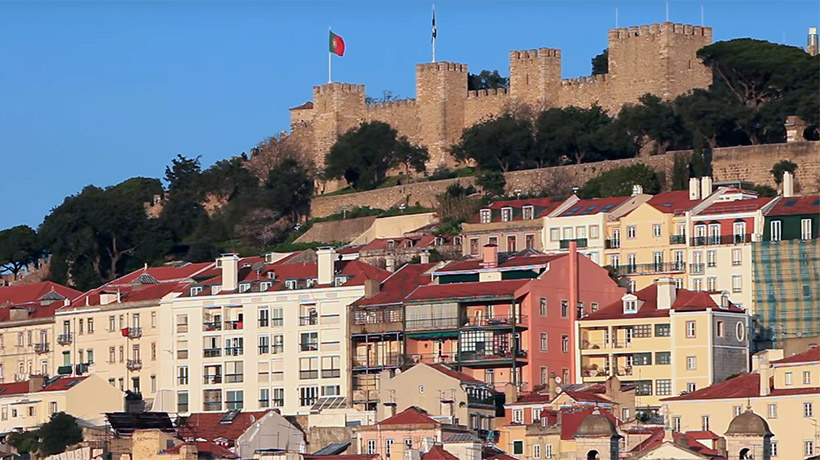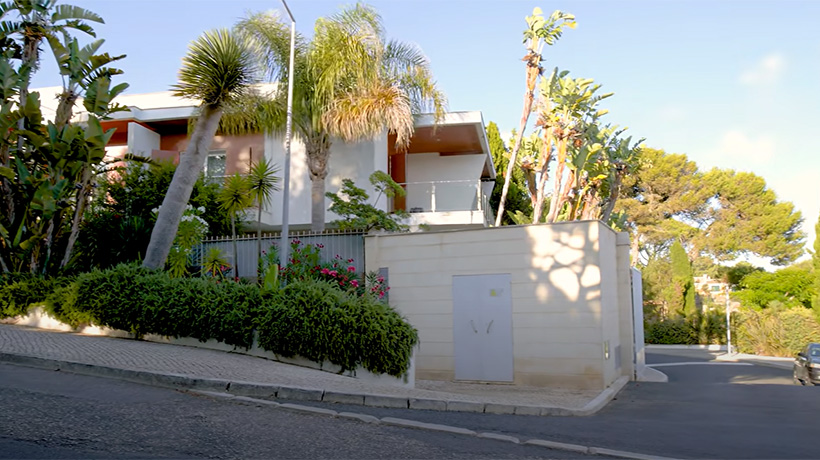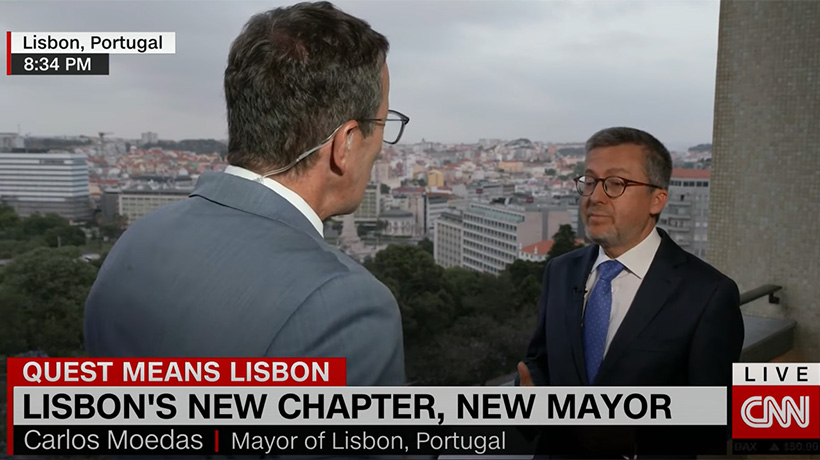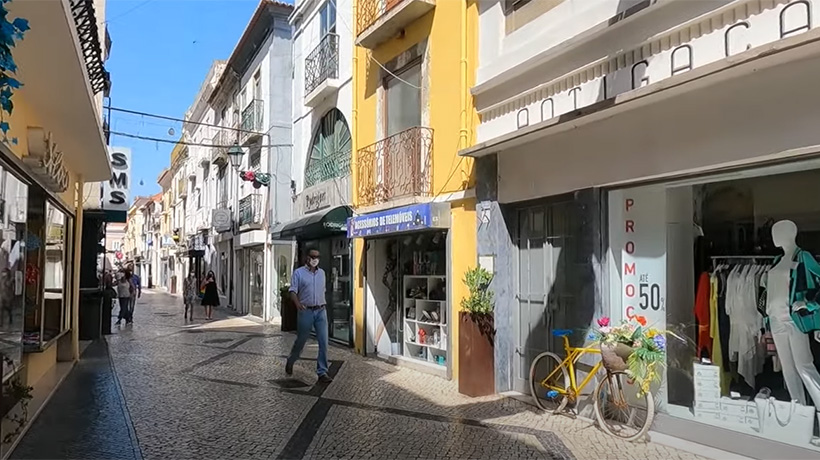Portugal’s house price boom continues!
Back to Newsstrongly, fuelled by surging demand as well as improved economic conditions. Property prices in Portugal rose by 6.09% (5.39% in real terms) y-o-y in 2018, to an average price of €1,220 (US$1,395) per square metre (sq. m.), based on figures released by Statistics Portugal (INE). During the latest quarter (Q4 2018), house prices increased 1.24% (2.03% in real terms) from the previous quarter.
After more than three years of depression, house prices in Portugal started to recover in 2014. House prices have been rising since.
In Lisbon metropolitan area, property prices were up by 7.9% (7.2% in real terms) in 2018 from a year earlier, to an average of €1,502 (US$1,717) per sq. m.
House prices rose in 23 of the country’s 24 urban areas. Porto recorded the highest increase of 15.6% during 2018, followed by Amadora and Seixal (13.9%), Sintra (13.7%), Setúbal (13.5%), Maia (13.4%), Almada (12.9%), Loures (12.6%), Barcelos (11.4%), Cascais (10.6%), Vila Franca de Xira (10.5%), Vila Nova de Gaia (10.3%) and Braga (10.1%).
Strong house price rises were also registered in Matosinhos (9.8%), Odivelas (9.7%), Gondomar (8.2%), Oeiras (8%), Vila Nova de Famalicão (7.5%), Leiria (6.6%) and Guimarães (6.4%).
Modest house price increases were seen in Santa Maria da Feira (4.6%), Lisbon (2.4%) and Funchal (2.3%). Only Coimbra saw a house price decline of 2% during 2018.
By property type:
- Flats prices rose by 7% (6.3% in real terms) y-o-y in 2018, to an average of €1,284 (US$1,468) per sq. m.
- Villa prices rose by 4.9% (4.2% in real terms) during 2018, to an average of €1,119 (US$1,279) per sq. m.
Demand is rising strongly. In Q3 2018, the total number of housing transactions in Portugal rose strongly by 18.4% to 45,935 units from a year earlier, according to INE. Likewise, the value of transactions surged 29.1% y-o-y to €6.28 billion (US$7.17 billion) over the same period. Clearly the new wealth tax introduced in 2017, applicable to higher-valued properties, has in fact had a negligible impact on the luxury housing market.
The Portuguese housing market is expected to remain buoyant this year, with Moody’s Investors Service predicting house price increases of between 7% and 8% every year until 2020.
There are no restrictions on foreign property ownership in Portugal and transaction costs are generally low.
Portugal will grant a 5-year residency permit to non-EU citizens who buy a minimum of €500,000 worth of property. The permit allows holders to work or study, as well as to travel in Schengen countries. They can opt to apply for permanent residency after five years.
The Portuguese economy expanded by 2.2% in 2018 from a year earlier, after annual rises of 2.8% in 2017, 1.6% in 2016, 1.8% in 2015, and 0.9% in 2014, according to the European Commission. The economy is expected to grow by 1.8% this year and by another 1.7% in 2020.
House prices surpassed pre-recession levels
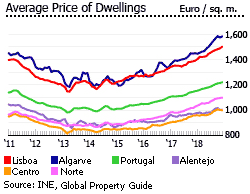
After experiencing significant house price falls from 2011 to 2014, Portugal’s house prices are now above the previous peak in 2009-10. The housing market began to recover in Q4 2014, after 13 consecutive quarters of y-o-y house price declines.
In 2018, nationwide house prices were already 3.6% above their previous peak seen in Q2 2010.
In the autonomous regions of Madeira and Azores Islands, house prices remain 7.3% and 6.9% down from their peak, respectively.
HOUSE PRICE CHANGE (%), 2018 |
||||
| Average price (Euro/sq. m.) | Y-O-Y change (%) | Q-O-Q change (%) | Change from peak (%) | |
| PORTUGAL | 1,220 | 6.1 | 1.2 | 3.6 |
| AM Lisbon | 1,502 | 7.9 | 1.8 | 3.7 |
| Norte | 1,098 | 6.9 | 0.7 | 9.8 |
| Centro | 999 | 4.3 | 0.2 | 1.2 |
| Alentejo | 1,003 | 3.0 | -0.9 | -5.8 |
| Algarve | 1,584 | 9.2 | 1.1 | 4.6 |
| Azores Islands | 1,058 | 5.9 | 1.8 | -6.9 |
| Madeira | 1,341 | 2.8 | 0.0 | -7.3 |
| Source: Instituto Nacional de Estatistica (INE) | ||||
The house price boom that swept most of Europe and the developed world from the mid-1990s to 2006 completely by-passed Portugal, except in the Algarve:
- 2003 - 2004: house prices rose by an average of 6.2% y-o-y (3.3% in real terms);
- 2005 - 2007: prices rose by an average of 1.25% (-1.3% in real terms);
- 2008: prices fell by an average of 4.7% (-7.1% in real terms);
- 2009: prices fell by an average of 2.6% (-1.8% in real terms);
- 2010 - 2012: house prices fell by an average of 3.1% (-5.5% in real terms);
- 2013-2014: house prices dropped by an average of 1.5% (-1.5% in real terms);
- 2015: house prices rose by 4.5% y-o-y (4% in real terms);
- 2016: house prices rose by 4.8% y-o-y (3.9% in real terms), and;.
- 2017: house prices rose by 4.6% y-o-y (3% in real terms).
Why did Portugal miss the boom? Largely because of sluggish economic growth. The country has grown by an average of just 0.5% annually over the past 15 years.
Portuguese property is very inexpensive.
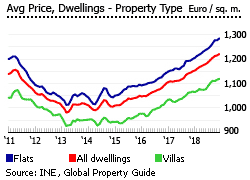
If we were to take account of inflation, these price declines would be larger (and the increases would be smaller). Currency falls are another factor. The 8.3% appreciation in the value of Euro against the US dollar in the past three years is still not enough to offset the 21% decline from 2013 to 2015.
From the perspective of the foreign buyer, Portuguese property is astonishingly good value. Algarve, which is known for its Mediterranean beaches and golf resorts, had the most expensive housing in Portugal, with an average house price of €1,584 (US$1,811) per sq. m. in December 2018. It was followed by Lisbon Metropolitan Area and Madeira, with average house prices of €1,502 (US$1,717) per sq. m. and €1,341 (US$1,533) per sq. m., respectively. Global Property Guide’s Lisbon square metre house price research finds that Lisbon city-centre prices are higher, at around €2,500 (US$2,858) per square metre for 120 sq. m. Lisbon apartments. On the other hand, a typical 120 sq. m. apartment in Algarve is priced around €1,800 (US$2,059) per sq. m.
Demand is surging
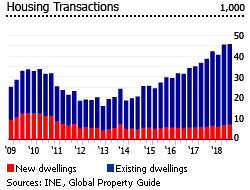
In Q3 2018, the total number of housing transactions in Portugal rose strongly by 18.4% to 45,935 units from a year earlier, according to INE. Likewise, the value of transactions surged 29.1% y-o-y to €6.28 billion (US$7.17 billion) over the same period.
In Q3 2018:
- Existing dwellings: the number of transactions increased 18.6% y-o-y to 38,988 units while transactions value soared 28.7% y-o-y to €5.05 billion (US$5.78 billion)
- New dwellings: the number of transactions rose by 17.4% y-o-y to 6,947 units while transactions value increased 30.9% y-o-y to €1.22 billion (US$1.4 billion)
Construction activity rising, but still way below peak levels
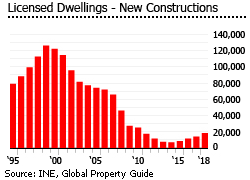
Construction activity in Portugal has been in decline since 2002. In fact, the number of licensed dwellings in new constructions plummeted by about 90% to 6,785 units in 2014, from 65,650 units in 2007, according to the INE. Licensed dwellings plunged by an average of 27% per year from 2007 to 2014.
However there have been signs of recovery in recent years. The number of licensed dwellings in new constructions rose by 21.8% y-o-y to 8,491 units in 2015, by 36.1% to 11,558 units in 2016 and by another 22.4% y-o-y to 14,143 units in 2017.
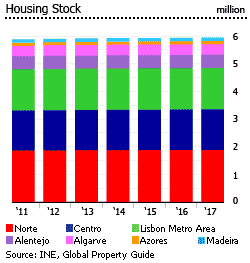
Dwelling completions also follow a similar pattern, rising by 4.8% y-o-y to 7,122 units in 2016 and by another 25.4% to 8,931 units in 2017 – in sharp contrast to an average annual decline of more than 28% from 2012 to 2015.
During the first eleven months of 2018, the number of licensed dwellings permits in Portugal surged 40.1% to 18,287 units from the same period last year. Algarve (74.2%) and Norte (46.6%) had the largest increases in the number of dwelling permits for family housing in the first eleven months of 2018 from the previous year. Strong increases were also seen in Lisbon (28.5%), Centro (31.5%), Alentejo (30.4%) and Azores Islands (20.8%). Only Madeira experienced a decline of 9.1% over the same period.
Total dwelling stock was 5,942,131 units in 2017, up slightly by 0.15% from a year earlier, according to INE.
New wealth tax
The strong demand and continued surge in house prices prove that the new wealth tax introduced in 2017 had a negligible impact on the luxury housing market.
The new wealth tax, officially called Adicional Imposto Municipal Sobre Imóveis (AIMI), is an annual tax, charged on the Valor Patrimonial Tributário (VPT) of higher-value properties, regardless of where the owner resides. Under the new wealth tax, the owner is liable if his/her property (or share of a property) is worth over €600,000.
- 0.4% for properties held by companies/corporate structures
- 0.7% for properties held personally or by un-administered estates up to €1 million
- 1.0% on the value of the holding in excess of €1 million
The €600,000 allowance is available to all individuals and estates, except to those tax affairs that are not in order. Married couples and civil partners can have a combined allowance of €1.2 million. Properties used in tourism or for commercial, agricultural, or industrial purposes are exempt.
The previous stamp duty tax on residential property valued at over €1 million has been abolished.
Lisbon’s rental yields are good
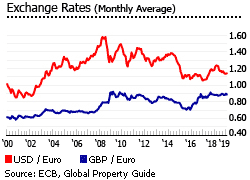
Apartments in Lisbon continue to obtain good rental yields, ranging from 4.5% to 6.7%, according to the Global Property Guide research. As a reminder, the rental yield is the total percentage return you would earn as a landlord, when renting out your property. Smaller apartments tend to be most profitable. A 50 sq. m. apartment in Lisbon returns around 6.32% rental yields, whereas a 250 sq. m. apartment returns only 4.5% rental yields. Good rental yields are also to be had from villas in Lisbon ranging from 5.45% to 6.05%, and again the rule is the larger the villa, the lower the yield.
Gross rental yields from apartments in Algarve are moderate, ranging from 3.5% to 3.8%. Algarve villas have even poorer rental yields, at around 2.84% to 3.04%.
In Lisbon, rents from apartments range from about €12 to €16 per sq. m. per month, so that a 120 sq. m. apartment can be rented for about €1,578 per month. Villas in Lisbon rent out for around €9 to €11 per sq. m. per month, and a 450 sq. m villa can be rented for around €4,185 per month.
Rents from apartments in the Algarve lower, ranging from around €4 to €6 per sq. m. per month, so you can expect monthly rental income of about €620 from a 120 sq. m. apartment. Villas in the Algarve rent for around €6 to per sq. m. per month, so you can expect monthly rental income of about €2,356 from a 300 sq. m. villa.
In terms of price to rent ratios, Global Property Guide research suggests that Lisbon is exceptionally good value.
Interest rates are astonishingly low
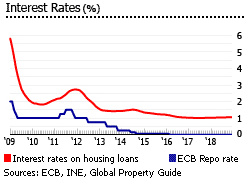
After continuously declining from 2012 to 2015, interest rates on housing loans were almost unchanged in the past three years. In December 2018, interest rates on housing loans stood at 1.053%, according to the INE.
By maturity (as of November 2018):
- Up to 1 year: 2.92%, up from 2.41% a year earlier
- Over 1 and up to 5 years: 2.68%, down from 2.92% a year earlier
- Over 5 years: 1.11%, slightly down from 1.13% a year ago
The exceptionally low mortgage rates were partly due to the recent rate cuts of the European Central Bank (ECB), from 1.5% in October 2011 to 0.05% in September 2014 and to 0.00% in March 2016.
The mortgage market is extremely sensitive to interest rate changes, since more than 93% of new mortgage loans have variable interest rates or initial rate fixation of less than one year, according to the European Mortgage Federation (EMF).
Shrinking mortgage market
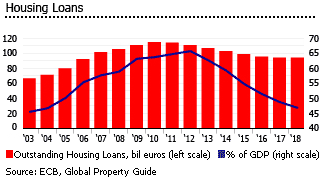
Portugal’s mortgage market grew from 41.5% of GDP in 2000 to 65.6% of GDP in 2012. But housing loans have declined for the past seven years by an average of 2.4% every year from 2011 to 2018. As a result, the mortgage market shrunk to just around 46.8% of GDP in 2018.
Despite very low interest rates, total outstanding housing loans declined slightly by 0.2% in December 2018 from a year earlier, to €93.95 billion (US$107.39 billion). In fact it was the lowest level since 2006.
Pent-up rental demand - new tenancy law
Portugal has one of the highest owner-occupation rates in Europe, partly caused by generous government mortgage subsidies having helped push up owner occupation from 52% of all housing in 1981, to 74% in 2013 and finally to more than 75% last year.
Meanwhile the private rental market has shrunk from 39% of total dwelling stock in 1981, to currently about 20%. The social rental sector is small at around 3% of the total housing stock, or 16% of total rental stock.
The shrinking of the private rental market was caused by tenancy laws that discouraged landlordism by giving tenants controlled rents and protecting them against eviction. As a result, young people either live at home, or pay exorasbitant key money, or buy an apartment. This has led to a considerable pent-up demand for rental housing.
Lease law 31/2012 provides more protections to landlords
Law 31/2012, which was passed by the Portuguese government on August 14, 2012, aims give more protection and rights to landlords. Previously, the country’s urban lease regime was strongly pro-tenant. The Portuguese government approved the new legal measure to reform the rental market, one of the conditions for the country’s €78bn bailout agreement from the IMF, ECB and European Commission.
Changes in the law include the following:
- The new legislation allows parties to agree on any specific period for the duration of the lease, instead of the previous minimum of 5 years. If a period is not defined in the contract, the lease is assumed to be set for two years, which can be renewed automatically.
- There is now a procedure for revising rental values: (1) landlord proposes a new rent to the tenant; (2) the tenant accepts or suggests a counterproposal; (3) if no agreement is reached the agreement may be terminated, and the landlord pays five years´ worth of rent as compensation. Exemption is given to tenants with financial difficulties, who enter a transitional regime with small rent increases for five years. A special transitional regime is also applicable to tenants over 65 years old, or with 60% disability.
- As with the previous law, in case of death of the tenant, the lease will be transferred to the spouse, common law spouse, or relatives, but now only for a period of two years. The tenant´s beneficiaries are not allowed to hold purchased or rented property within the same municipality, or in Lisbon and Oporto´s case, in neighbouring municipalities either.
The new law also strengthens the landlord’s ability to terminate a lease agreement:
- The landlord has the right to terminate the contract if the tenant fails to pay two consecutive rents and still hasn´t paid the rents due at the end of the third month.
- If the tenant fails to pay on time (or more than eight days after the due date) for four times in a year, the landlord can terminate the contract.
- The landlord is allowed to terminate the contract by notifying the tenant of its intention to terminate the contract with at least two years notice.
- If the landlord wishes to demolish or undertake works on the property, he may also terminate the lease.
The law aims to update the rents of older contracts, as well as amending the Law 6/2006 or the New Urban Lease Act (Novo Regime de Arrendamento Urbano - "NRAU") - an attempt to solve old lease issues.
The new legislation also includes a special procedure on evicting tenants who do not vacate the property on the specified date by the court or the contract. It also creates the National Office for the Leases (Balcão Nacional de Arrendamento) where a landlord may apply so as to notify the tenant to vacate the property.
Landlords felt the new laws were long overdue. According to the President of the Lisbon Property Owners’ Association, Luis Menezes Leitao, foreigners find the old law hard to believe, and he recounts that some people in central Lisbon pay rents as low as €5 a month.
Modest economic growth; improving finances
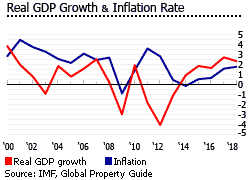
The Portuguese economy expanded by a modest 2.2% in 2018 from a year earlier, after annual rises of 2.8% in 2017, 1.6% in 2016, 1.8% in 2015, and 0.9% in 2014, according to the European Commission. The economy is expected to grow by 1.8% this year and by another 1.7% in 2020.
The improving economic condition comes after a series of dismal years. Portugal’s economy contracted 1.1% in 2013, 4% in 2012, and 1.8% in 2011, according to the IMF. In 2010, the economy grew by 1.9%, but in 2009 GDP contracted by 3%, after average annual growth of only 1.2% between 2004 and 2008.
Portugal was the second euro zone country to exit its bailout program in May 2014, after three years of austerity. Portugal had sought its €78 billion (US$89.2 billion) bailout program in 2011, due to the government’s inability to meet its debt payments.
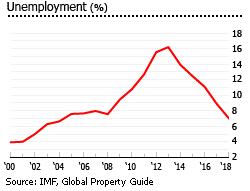
Portugal still faces a huge public debt burden of around 121.5% of GDP in 2018, but it is already an improvement from 124.8% in 2017, 129.9% in 2016, 128.8% in 2015 and 130.6% in 2014, according to the European Commission. The country’s public debt is expected to fall to around 119.2% of GDP in 2019 and to 116.8% of GDP in 2020.
The country’s fiscal deficit stood at 0.7% of GDP in 2018, sharply down from 3% in 2017, 2% in 2016, 4.4% in 2015 and 7.2% in 2014. The deficit is expected to fall further to around 0.6% of GDP this year and to 0.2% of GDP in 2020, according to the European Commission.
Inflation stood at 0.7% in December 2018, down from 0.9% in November, 1% in October and 1.4% in September 2018, according to INE. Inflation is expected to accelerate to 1.6% this year, from an annual average of just 0.8% in the past six years, according to the IMF.
Unemployment was 6.7% in November 2018, down from 8.2% from the same period last year, according to INE. Portugal’s jobless rate averaged about 13.2% from 2011 to 2017.
Source: https://www.globalpropertyguide.com/Europe/Portugal/Price-History





